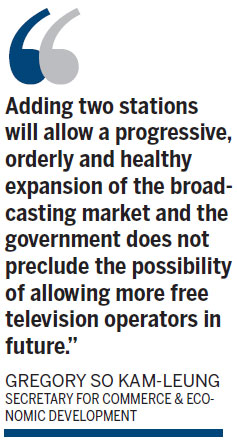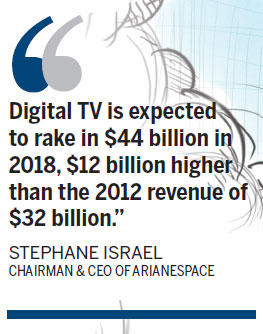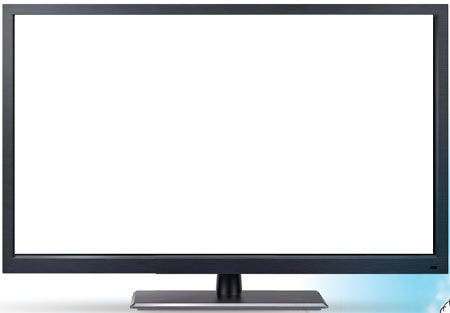Free-to-air stations are go
Updated: 2013-10-18 08:37
By Wong Joon San(HK Edition)
|
|||||||
Tuesday's approval by the Executive Council of two new television licenses comes as welcome relief for long suffering viewers, who complain that a lack of competition has blunted the local industry's creative edge. Wong Joon San reports.
The new licenses grant approval to Fantastic Television and Hong Kong Television Entertainment Company to operate in the city's free-to-air television market. The new channels will commence operations within 12 months.
Fantastic Television, which will invest $1 billion in the first six years of operation, is owned by i-Cable Communications. Hong Kong Television Entertainment Company, which will invest $600 million in its first three years of operation, is owned by PCCW-HKT. Both parent companies are established subscription TV networks and Internet service providers.
The real beneficiaries however are members of the public who have been clamoring for more stations, and more competition for years, saying that the two local broadcasters, ATV and Pearl TV had lost their creative flair and that the market needed more competition.

The government has responded cautiously, and slowly to public demand. Tuesday's announcement marked the first change in the industry in more than 40 years. It was a long time coming.
So said the decision will bring more investment into local program production, meaning more choices for viewers, and creating more job opportunities in the creative industries.
"Adding two stations will allow a progressive, orderly and healthy expansion of the broadcasting market and the government does not preclude the possibility of allowing more free television operators in future," Secretary for Commerce & Economic Development Gregory So Kam-leung, says.
Commenting on the licenses issuance, Xu Yan, Associate Dean of Hong Kong University of Science and Technology (HKUST) Business School, says: "I am glad the free TV broadcasting market has begun to be liberalized. As to how many operators Hong Kong can have, nobody knows as the market will decide.
"Given Hong Kong is transforming from Analog TV to digital TV, there is space for further liberalization. The government should give a clear and transparent criterion for the beauty contest process for license issuance as The Office Of The Communications Authority (OFCA) has done for telecom licenses. If there is no technical constraint such as spectrum, I don't see any necessity to limit the number of licenses."
The Democratic Alliance for the Betterment and Progress of Hong Kong welcomed the government decision.
The government will meet with the two broadcasters to discuss license conditions. Recommendations will be forwarded to the CE in Council for final approval of the licenses.
Fantastic Television and Hong Kong Television Entertainment were each given two free-TV channels - one in Cantonese and one in English - to provide programs for news, documentaries, current affairs, children, youths, the elderly and culture.
The big shocker was the rejection of a third application by Hong Kong Television Network (HKTV) which failed to win approval after much hype and an investment of more than HK$300 million.
HKTV CEO, Ricky Wong Wai-kay, said he was shocked and disappointed. Still, there's not much he can do. The Executive Council (ExCo) decision is final. There's no avenue of appeal.

One of the key reasons ExCo granted two and not three licenses hinged on the question of overall sustainability of the industry. There was a consultant's report evaluating the impact of the additional competition.
Asked why the government rejected HKTV, despite the company's heavy investment, So would only say: "It is only a commercial decision (by Ricky Wong's company)."
ExCo deliberations are held under strictest confidence and So declined to elaborate on his terse remark.
Wong says HKTV would be restructured and the company reorganized to take on new challenges. Nonetheless, it's sad news for 320 company employees from production and creative teams who will lose their jobs. HKTV has 500 employees and 250 contracted artists. Wong denies that the layoffs are intended to put pressure on the government.
HK satellite launch
Digital TV research released in March, reveals that pay TV revenue will rise dramatically during the transition from analog to digital TV. "Digital TV is expected to rake in $44 billion in 2018, $12 billion higher than the 2012 revenue of $32 billion," says Stephane Israel, chairman and CEO of Arianespace.
"The trend in Asia is to move from precision TV to high-definition TV, resulting in demand for more capacity. It is a cycle between innovation brought by TV manufacturers and satellite capabilities," Israel says.
China Daily has learnt that Bermuda-based Asia Broadcast Satellite (ABS), which operates a branch office in Hong Kong, expects similar trends to happen in other countries with customers driving demand.
ABS plans to launch a satellite early next year, through the services of Arianespace 5, a satellite launcher to tap such business in other countries.
ABS already operates five satellites - ABS-1 (offering multi-channel per carrier (MCPC) platforms for Hong Kong, the Philippines, Indonesia and Bahrain), ABS-1A, ABS-2i, ABS-3 and ABS-7, for customers who offer communications and pay-TV services in those markets.
In Hong Kong, ABS offers iDirect broadband services through three hubs. ABS owns and operates multiple iDirect hubs situated at its teleport sites around the world to provide global connectivity.
"ABS-2 will be launched early next year," ABS Chief Executive Officer Tom Choi, who lives in Hong Kong, confirms in an e-mail interview. "ABS-2 will be used by (our) customers in Russia, Southeast Asia, Africa and the Middle East for television distribution and telecommunications services."
Even before the ABS-2 launch, it has already signed up customers in Africa. A great deal of interest has been expressed by Russian communications and pay-TV providers.
Choi, who was named "Satellite Executive of the Year 2012", says the investment in ABS-2 is more than $380 million, and the project is financed by the US EXIM bank.
The new ABS-2 satellite weighing 6,300 kilograms will be operated by a joint venture with shareholders in the countries to which it will provide coverage.
Basically, the tremendous customer demand for greater communications via broadband and pay-TV is putting greater pressure on satellite operators to invest more into equipment to provide telephone network operators and pay-TV operators with even more capacity, which is being snapped up as the capacity enters the market.
Israel says: "In talking to satellite operators about market growth, there is consensus that there will be double-digit growth for broadcast and broadband in Asia. Australia is a huge country and the country has signed a deal to launch two satellites at the beginning of this year."
All these mobile communications systems, television and radio services, depend on satellites.
Asked whether there was a correlation between TV and antenna size on spacecraft, Richard Bowles, managing director of Arianespace, says: "The key market is TV, and there is a link between the size of antenna on spacecraft and on the Earth. The bigger they are in space, the smaller they can be on Earth. As everybody wants small and discrete antennas on Earth, they are getting bigger in space, and so are satellites, because the more power in space, the better the quality of the signal on Earth."
Contact the writer at joonsan@chinadailyhk.com


(HK Edition 10/18/2013 page6)